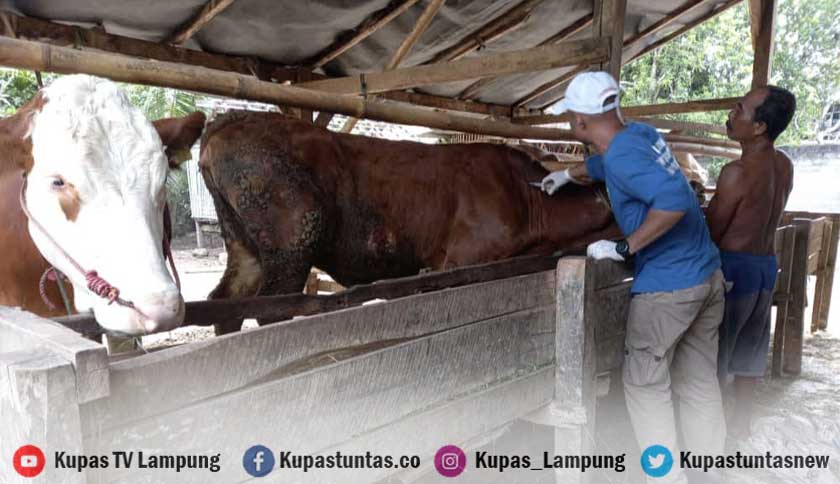Cows Exposed to LSD Disease in Metro Lampung Increased by 12 Cows

Health worker giving an injection of medicine to a cow infected with LSD. Photo: Kupastuntas.co
Kupastuntas.co, Metro - The Metro City Food Security,
Agriculture and Fisheries Service (DKP3) recorded an additional 12 cases of
livestock exposed to Lumpy Skin Disease (LSD). From previously 35 tails now become
47 tails.
Head of Metro City DKP3, Heri Wiratno, revealed that all
livestock infected with LSD were cattle. Of the 47 animals suffering from LSD,
one animal has been declared cured.
"The total number of cows exposed to LSD has increased to
47 cows. Previously there were 35 cows, so the increase was 12 cows. But 1 cow
has been declared cured," he said Friday (12/5/2023).
Heri said that now exposure to LSD in livestock has spread to
four sub-districts throughout Metro. Livestock exposed to LSD experience symptoms
of growing lumps on the skin.
"Initially yesterday it appeared in Metro East, in the
Yosodadi and Tejosari Subdistrict areas. Then in Metro South District in
Margodadi and Sumbersari Sub-Districts, the same as Rejomulyo. Now it is in
North Metro in the Karangrejo Sub-District area, it is the same in Metro West
Sub-District in Mulyojati Sub-District," he explained .
"Cows that are exposed to LDS usually experience symptoms
of lumps appearing on the cattle's bodies. In addition, cows that are affected
by this disease also experience fever and have no appetite," he added.
Heri admitted that his party had been intense in preventing
exposure and treating sick cows by giving them vitamins and antibiotics.
"Prevention efforts are carried out by vaccinating healthy
animals. Then limiting the infected areas, apart from that we have also carried
out sanitation in the cages," he said.
Separately, Head of Animal Husbandry Division of Metro City
DKP3, Lina Oktira, admitted that her party had moved to provide free medical
treatment for livestock affected by LSD and Mouth Nail Disease (PMK).
"We urge all breeders to spray insecticides while still
paying attention to the safety of livestock. So the point is to drive away
insects such as flies, mosquitoes and ticks from the cages. Spraying is done
with the right dose so that the livestock's skin does not blister," he
explained.
"To anticipate breeders who have not received treatment
from Puskeswan, this free treatment is being carried out. We have distributed
flyers and brochures containing contact persons for veterinarians on duty in
each sub-district," he stated. (*)
Berita Lainnya
-
Crude Oil-Like Waste Pollutes Bandar Lampung Beach, Fishermen Have Difficulty Finding Fish
Senin, 13 November 2023 -
271 Hectares of Agricultural Land in West Lampung are at Risk of Harvest Failure
Rabu, 25 Oktober 2023 -
11 Coal Stockpiles in Bandar Lampung Operate Near Residential Settlements
Rabu, 25 Oktober 2023 -
30,631 Recipient Families in West Lampung Receive Phase Two of Rice Social Assistance
Selasa, 24 Oktober 2023









